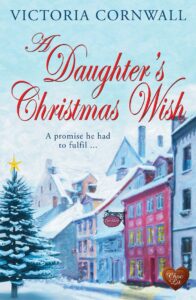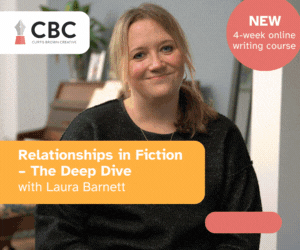Victoria Cornwall: A World War 1 Story
12 December 2018

I’m delighted to welcome Victoria Cornwall to the blog today. Victoria writes fabulous historical novels based in Cornwall, and today I’m excited to learn a little bit more about her latest novel, A Daughter’s Christmas Wish.
This year I faced a writing vs promotion conundrum – a problem, I hasten to add, which was totally of my own making. I have always been aware that new releases are sometimes linked to seasons, celebrations or anniversaries for marketing purposes. We are all used to seeing book shelves littered with beach and holiday reads in the summer and even the Royal wedding set of a small flurry of royal romances. Christmas is no exception and a new wave of Christmas reads have now hit the shops and line the digital marketing banners. This year, I am proud to say, that my first Christmas novella, A Daughter’s Christmas Wish, is amongst them. So what was my problem?
When my publisher asked if I wanted to write a Christmas novella, I jumped at the chance as I knew it would open my writing up to a new audience. I wanted to set my story against a backdrop of WW1 and its aftermath. The 100th anniversary of the armistice was approaching, and it felt the right time to finally write about the subject. The “business side” of my character realised that there would be two potential marketing opportunities – Christmas and the armistice anniversary, but despite this potential timing advantage I felt very uneasy at the prospect of promoting A Daughter’s Christmas Wish at a time when the nation would be in a period of remembrance. I hasten to add that my publisher was more than happy for me not to use the anniversary to promote my novella, it was me that was driving this potential avenue. So that was my conundrum, wanting to promote and exploit an anniversary, but feeling bad for doing so. I had never experienced this feeling of unease before as a direct result of creativity, promotion and anniversaries jarring against one another. Why such unease? Because, in truth, the real reason for setting my novella against a backdrop of WW1 had nothing to do with the marketing opportunity at all.
I am from the generation who knew someone who fought in WW1. I have fond memories of my grandfather sharing his wartime experience with me. His shrapnel scar made the war tangible, his knife, confiscated from a German soldier, made it real as I could hold it in my hands. I was aware, from a very young age, that if he had not survived, I would not have been born. My great aunt lost her fiancé in the war and remained a spinster for the rest of her life. Even as a young girl, her change in circumstances taught me that the ripples of war can spread far beyond the battlefields. The experience of these modest, elderly relatives set off my lifelong interest in WW1 and WW2 and a deep respect for those who lived through that time. I wanted to write a story about that period and keep their experiences, and the experiences of others, alive for a new generation to hear. However, I knew that if I was going to write a WW1 Christmas novella, I would have to balance being truthful to those who lived through that period, with the joy and anticipation expected in a festive story. It would be a fine line to tread.
The voices of the soldiers and families who experienced WW1 have now fallen silent. I had wanted to use my own creativity to keep those voices alive by reaching a new audience who have had no tangible connection or interest in the war before. The feedback, since its release, has been overwhelmingly positive and heart-warming. I wrote about a young woman having her Christmas wish granted by a lone soldier returning from the war, but now, having reached a new audience some of which had no interest in that period of time before, I feel as if my own wish has been granted too – to remember those who have gone before and for others to learn of it too.
Thanks, Victoria for a really fascinating insight into not only the motivation behind the story, but an intriguing dilemma. Now, if you don’t mind, I’d love to ask you a few more questions about the book.
How did you balance the realities of war with all the elements required for a satisfying festive read?
I set the story a year after the war had ended, when people and returning soldiers were learning to live in peacetime again. I hope the reader feels as if they are learning to enjoy Christmas along with the characters as the festive countdown begins. They have their ups and downs as some are still grieving, whilst others are reluctant to take up normal life again, but day by day, they learn to enjoy Christmas again and discover what is really important to them all. The characters and plot are fictitious, but to remain truthful to the time and be respectful to the period, the hero’s wartime postings and battles … even what he had to eat on Christmas Day, is based on the war records, diaries and reports of the battalion my maternal grandfather fought in all those years ago. As well as the festive preparations and growing romance between the two main characters, I wanted the reader to feel that they had experienced that period in time and walked in their shoes in some small way.
Could we read a small extract from the first chapter?
Yes of course. Just to set the scene, a lone soldier, Nicholas, returns to Cornwall to fulfil a promise he made to his friend in the trenches of the Western Front – to give his friend’s fiancé the Christmas she had always wished for. Nicholas is about to meet Rose for the first time and he is standing in the street watching her through the window.
Nicholas recognised the woman in the tea shop immediately, despite having never met her before. He had no doubt it was her. He had gazed at her face more times than he cared to admit to and knew every feature as well as his own. She was the first thing on his mind upon waking and the last when he closed his eyes at night. She even visited him in his dreams – an intangible presence that would not stop haunting him after all this time. What would she think if she knew he carried her photograph in his pocket and had done so for more than a year? Yet she probably didn’t even know he existed. He knew a lot about her, though, and why she carried so much sadness in her eyes.
Christmas and the New Year are getting close now. What exciting projects do you have planned for 2019? Can you tell us a little about them?
I have a new release coming out in the spring. I am very excited about this novel, which is my daughter’s favourite. It is currently untitled and will be the fifth book in my Cornish Tales series and tells the story of the mother of the hero in A Daughter’s Christmas Wish. His mother is an advocate for women’s rights and the new release in the spring will tell the story of what made her into the woman she is today and her love for the man who became the greatest passion in her life. All the books in the series are set in Cornwall and are stand-alone novels; however the main character of each novel is a descendant of the heroine in the first book of the series, The Thief’s Daughter.
Thank you again, Victoria, for talking to us today about your book. I wish you every success with it, and I can’t wait to read your new story.
Thank you for having me on the blog. I’ve enjoyed talking about the conundrum I faced as I’m sure I’m not the only author who has faced the unease of taking advantage of a promotional opportunity for a subject and cause that is very close to their heart.
About Victoria

Victoria Cornwall can trace her Cornish roots as far back as the 18th century and it is this background and heritage which is the inspiration for her Cornish Tales series. Following a fulfilling twenty-five year career as a nurse, a change in profession finally allowed her the time to write.
Victoria’s writing has been shortlisted for the New Talent Award at the Festival of Romantic Fiction and twice nominated for the RONÉ “Best Indie or Small Published book” Award. In 2017, her debut traditionally published novel, The Thief’s Daughter, published by award winning independent publisher, Choc Lit, was a finalist for the Romantic Novelists’ Association’s Joan Hessayon Award. A Daughter’s Christmas Wish is the fourth book in the Cornish Tales series.
Victoria is married and has two grown up children. She likes to read and write historical fiction with a strong background story, but at its heart is the unmistakable emotion, even pain, of loving someone.
A Daughter’s Christmas Wish
Amazon UK:- https://amzn.to/2rnZX5p
Amazon US:- https://amzn.to/2SxjoUC
All other ebook platforms:- books2read.com/u/mgLWdz
Website:- https://victoriacornwall.com/
Twitter:- https://twitter.com/VickieCornwall
Pinterest:- https://www.pinterest.co.uk/vickiecornwall/
Instagram:- https://www.instagram.com/victoria_cornwallx/
Quarterly Newsletter:- http://eepurl.com/cFrw0D
*
Ruby Moone writes mainly historical romance but has recently made her first foray into contemporary. She has always been an avid reader, and loves all kinds of stories, but she fell in love with the Regency period after reading Georgette Heyer when she was very young. Her stories are largely gay romances, focusing on the relationships between men. She publishes with JMS Books LLC and also independently. Her Christmas release, Trusting Jack, is available now.




